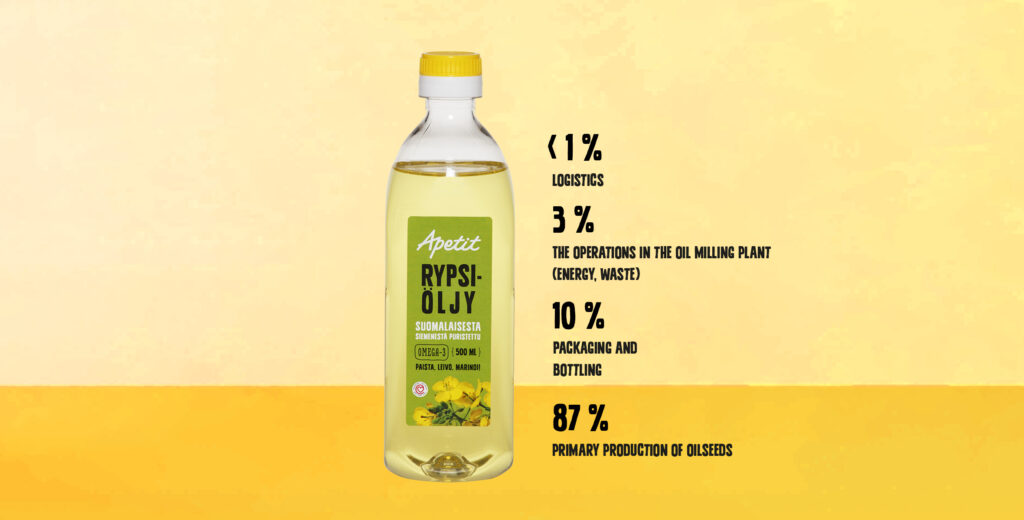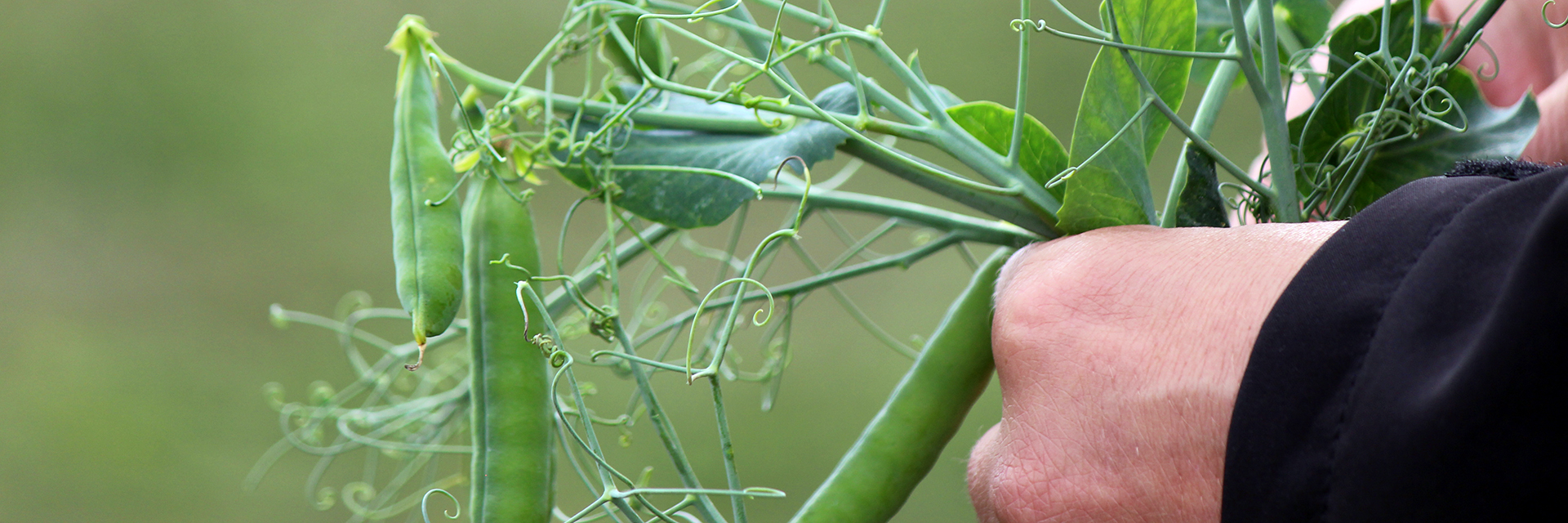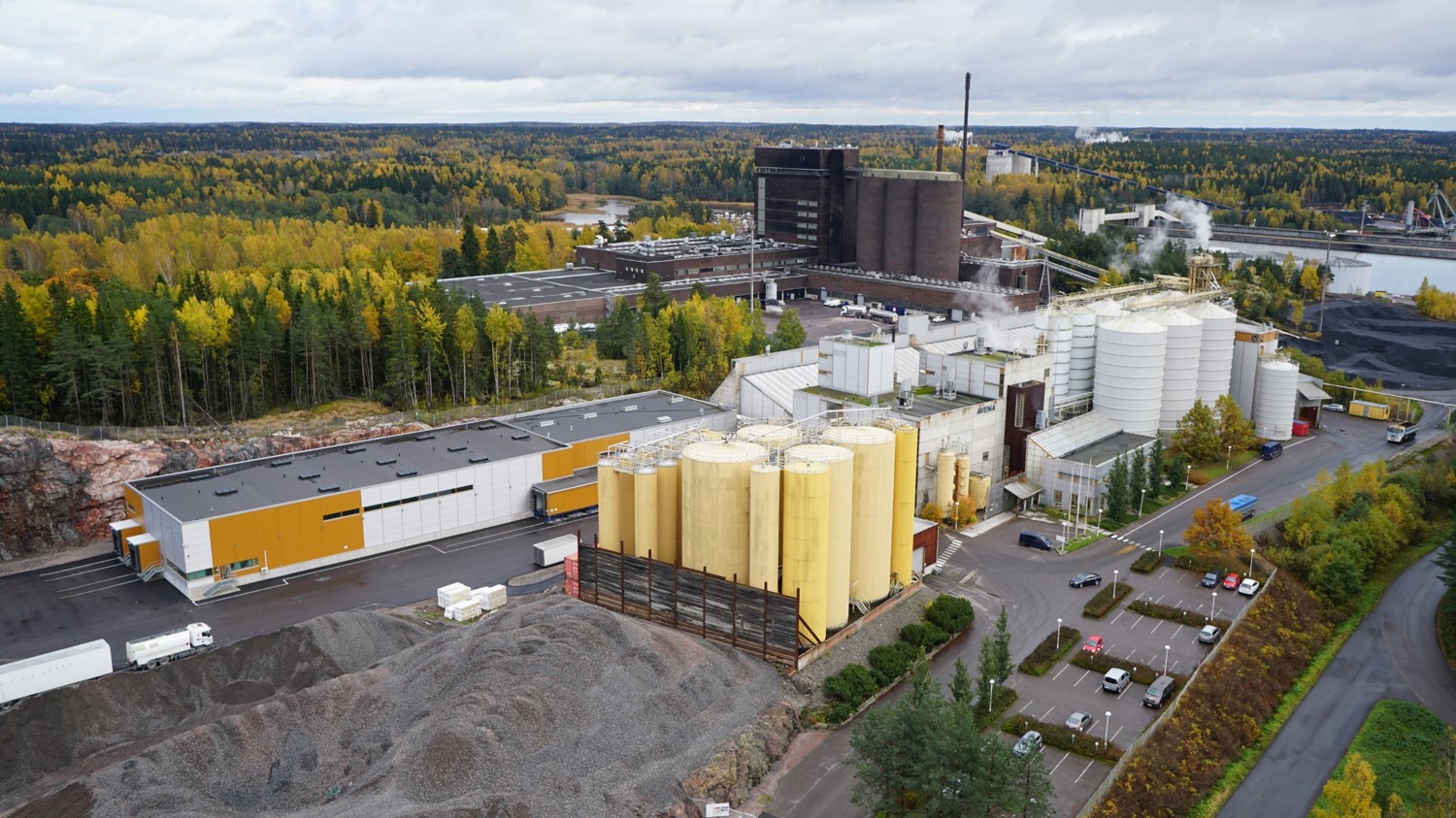Apetit determined the carbon footprint of rapeseed oil
Apetit carried out a carbon footprint study for domestic rapeseed oil. The carbon footprint of the Apetit rapeseed oil sold in PET plastic bottles through retail channels is 2.7 kg CO2 equivalent per kg. Up to 87 per cent of climate impacts are generated by primary production. The relatively high share of primary production in the carbon footprint of rapeseed oil is partly explained by the natural harvest level of oilseed plants.
The share of the Kantvik vegetable oil milling plant, i.e. oil processing, in the product’s climate impacts was very small (3 per cent). This is due in particular to the high share of renewable energy resources used at the milling plant and the plant’s energy efficiency. Packaging and bottling account for 10 per cent of the product’s climate impacts. The carbon footprint was also calculated for the Neito rapeseed oil in glass bottles: the carbon footprint of this product was approximately 7 per cent higher.
According to the study results, the most significant climate impacts of rapeseed oil during its life cycle come from primary production. Avena, responsible for Apetit Group’s Oilseed Products business, takes part in the RypsiRapsi2025 project, which aims at finding and spreading the best cultivation practices and developing harvest levels.
The carbon footprint of domestic rapeseed oil was calculated, as far as possible, using the figures of Apetit’s own value chain, i.e. primary data. Five-year cultivation data were used in the calculation of the climate impacts of domestic rapeseed cultivation. Apetit commissioned the study from the Natural Resources Institute Finland.
How the climate impacts of Apetit rapeseed oil arise:

Related articles

Safety at work is developed by means of proactive operating model
Safety at work plays a significant role at Apetit and is one of the key themes of its personnel strategy. The goal is to reduce occupational accidents to zero and to reduce sickness absences. Safety at work training is organised at all Apetit Group operating locations. In 2019, some 280 Apetit employees took part in safety at work training. In addition to on-site safety training and occupational health and safety days organised at the production plants, topics related to safety at work are regularly covered in Apetit’s online learning environment. The training activities have led to a substantial increase in the number of safety observations, for example. Key measures to develop safety at work include increasing communication about occupational safety, in addition to more systematic safety observation practices and the further development and harmonisation of location-specific occupational health and safety committees. In order to prevent occupational accidents, Apetit regularly updates occupational safety guidelines. In addition, we have improved our know-how in risk evaluation and incident investigation and systematically conducted risk assessments regarding production tasks. In 2019, Apetit continued to offer a reward for days without any incidents at each location.

Räpi Experimental farm is part of Carbon Action project
Apetit’s Räpi experimental farm, located in the Satakunta region, joined the Carbon Action project along with more than a hundred other Finnish farms. Carbon Action promotes the wider adoption of climate-friendly farming practices, helps farmers implement farming practices that sequester carbon and improve soil fertility, and conducts scientific research to verify soil carbon storage. Carbon Action is a joint project by the Finnish Meteorological Institute and Baltic Sea Action Group (BSAG) and it combines top-level research with work in the field by farmers. Apetit is offering the use of the Räpi experimental farm for the project for a period of five years to promote research, development and practices associated with carbon farming. Apetit has made a Baltic Sea commitment for 2019-2025 Apetit made a Baltic Sea commitment for BSAG for the period 2019-2025. The core purpose of Apetit’s commitment is to generate data that can be used in contract growing especially in improving soil fertility and related to carbon sequestration. The objective is to promote, through Apetit’s contract growers, a sustainable food chain and to commercialise carbon farming methods that help sequester carbon. The commitment has two parts: Apetit will include the best growing practices proven by the carbon pilot in its contract farmers’ farming guidelines and provide training to all of its contract farmers on farming methods that improve soil fertility and carbon sequestration. Apetit will also include the Räpi experimental farm in the research project to promote measures that advance carbon farming. Under the commitment, Apetit will also join the company network of the Carbon Action platform which enables the various parties in the food chain to collaborate and to develop their own operations with regard to carbon farming.

Apetit reduces its environmental impacts by investment in a bioenergy plant
One of the objectives of Apetit’s corporate responsibility programme is to reduce the Group’s carbon dioxide emissions* per production tonne by half by the end of 2022, using the current level as the baseline. This target will be achieved with the help of the bioenergy plant to be built at the Kantvik vegetable oil milling plant. Oil milling is the Group’s most energy-intensive process. The bioenergy plant will replace the current energy solution based on non-renewable fuels, which means it will have a significant impact on CO2 emissions. The bioenergy plant will also make the production facility more self-sufficient with regard to energy. In addition to reducing CO2 emissions, the bioenergy plant creates the opportunity to make more efficient use of production side streams in energy production. The bioenergy plant can be used to burn byproducts such as the straw waste included in seed deliveries and waste from screening processes. In the future, the steam energy required by the plant will be produced by the bioenergy plant. The plant is scheduled to be completed in the end of 2020. The size of the investment is EUR 5.2 million. *The calculation of Apetit’s climate impacts is based on the energy consumption of the company’s production plants and the way the energy is generated.
 Share
Share Facebook
Facebook
 LinkedIn
LinkedIn
 Email
Email

